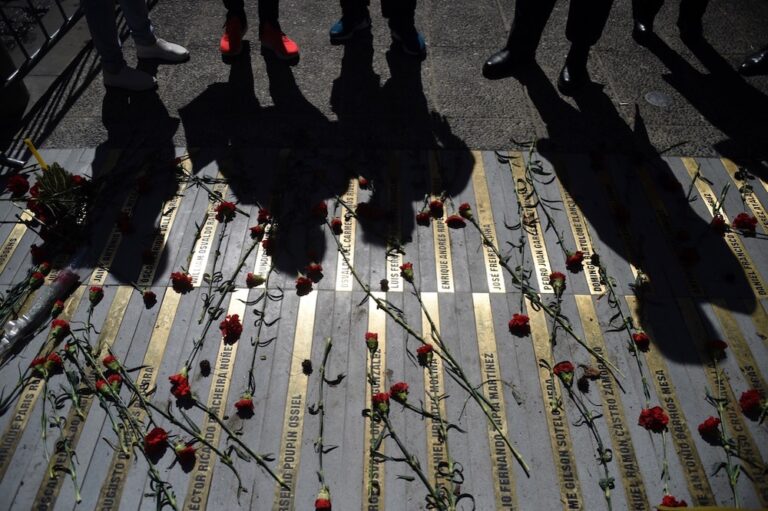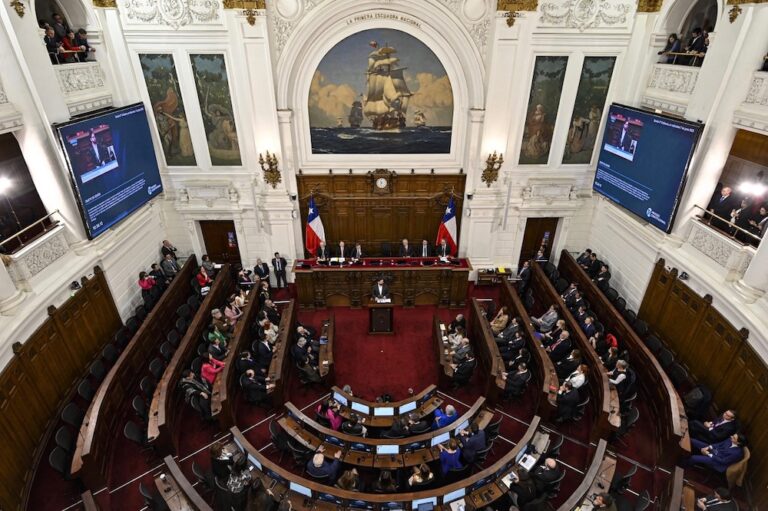(PERIODISTAS/IFEX) – The following is a 20 April 2001 PERIODISTAS press release: Chilean Senate approves new Press Law On 18 April 2001, the Chilean Senate approved the new Law on Freedoms of Opinion and Information and the Practice of Journalism (ley de Libertad de Informacion, Opinion y Ejercicio del Periodismo), known as the Press Law. […]
(PERIODISTAS/IFEX) – The following is a 20 April 2001 PERIODISTAS press release:
Chilean Senate approves new Press Law
On 18 April 2001, the Chilean Senate approved the new Law on Freedoms of Opinion and Information and the Practice of Journalism (ley de Libertad de Informacion, Opinion y Ejercicio del Periodismo), known as the Press Law. The final text of the law, approved a week ago by the Chamber of Deputies, remains intact. Though a notable advance for freedom of expression, nevertheless, the final text does not completely eradicate the norms that shape “desacato” (“insult”) laws.
The only modification introduced by the Senate to the bill approved by the deputies is the repeal of the provisions that regulate control of media ownership. The law, ready to be enacted, is pending review by the Constitutional Tribunal, which will determine if all provisions respect the Chilean Constitution.
The law approved maintains the Chamber of Deputies’ proposition that eliminates the Law on Publicity Abuses (Ley de Abusos de Publicidad, LAP) and introduces modifications to the State Security Law (Ley de Seguridad Interior del Estado, LSIE). The first law defines the public and private spheres and establishes penalties for those who report on the private lives of civil servants, even when that information is of interest to the public. Articles 6(b), 16 and 30 of the LSIE bestow judicial privilege upon the highest government authorities enabling them to initiate legal proceedings when they feel that they have been victims of defamation, insult or slander. These articles also allow military tribunals to judge civilians when the official in question is a member of the Armed Forces.
With the elimination of Article 6(b), defamation against high authorities will no longer be considered a crime against public order. The repeal of LAP means that the privacy of civil servants is no longer protected when the private acts reported on are related to issues that affect the public good. Nevertheless, the Chilean government endeavours to maintain the repeal in a transitory state during the next nine months in order to outline a more efficient proposal.
The law approved by the Senate preserves the consecration of the right to protect confidential sources. It also allows for evidence of “truthfulness” to be admitted in insult cases. As a result, journalists will not be found to be at fault when it is proven that the offensive declarations are based on the facts and refer to civil servants’ practices that are in the public interest.
Reform of the law also eliminates judges’ authority to prohibit the publication of information about court cases in progress and consecrates the conscience clause, which exempts journalists from writing or revealing that which goes against their convictions.
However, the new Press Law does not completely eradicate the concept of “desacato” (“insult”) from the law books. Criminal Code Articles 263, 264 and 265 still remain and continue to apply provisions similar to Article 6(b) of the LSIE. The original bill put forth by the executive included the repeal of these articles but right-wing, centrist, and even some left-of-centre legislators pushed for these provisions to be maintained in exchange for the eradication of Article 6(b).
The approved law repeals Article 16 of the LSIE, which allows judges to seize and suspend circulation of press editions and radio and television transmissions when these media are accused of crimes against high-ranking government authorities. Article 30 of the same law remains intact, however, authorising judges to “order, as a first step (…) the confiscation of any printed matter, books, pamphlets, records, movies, videotapes and any other object that was used to commit a crime, and the placement of all such objects at the court’s disposal”.
With regards to media market regulation, the Senate removed one of the most controversial articles, Article 44. This provision mandated that no individual who owned or held shares in a public television station could be part owner of another public television station, which covered the same service area. The senators repealed this article because it violates freedom of ownership and enterprise.
However, the law does not minimise control exercised by the Chilean government over the television broadcasting system, which is based on state concessions of signals. The Senate maintained Article 39 of the law, which obliges providing notification of any change in ownership or control of media outlets to the Preventative Anti-monopoly Commission (Comision Preventiva Antimonopolios). The commission is in charge of determining whether or not the company’s new constitution will have an adverse effect on market competition.
Elimination of Article 6(b) of the LSIE implies that once the new Press Law is enacted, current court cases based on this provision will no longer be valid. Journalist Alejandra Matus, sentenced for her book “The Black Book of Chilean Justice” (“El Libro Negro de la Justicia Chilena”), could request that the charges and the arrest order against her, and the Chile-wide ban of her book be annulled. Matus did not hide her happiness for the opportunity to return to her country as a free person but lamented the persistence of restrictions on freedom of expression. “Other laws remain in the Chilean legislation, which concede privileges to authorities when faced with public criticism,” stated Matus.
Human Rights Watch (HRW), one of the largest human rights organisations in the world, expressed both delight and disgust over the approved legislation. Executive Director José Miguel Vivanco noted that, “the new law is good news for those who face charges of defamation under the State Security Law, and for democracy and for press freedom in Chile, but there is still a great deal to be done in order to reconcile Chilean legislation with international standards.”
Vivanco emphasised the advances gained by the new law but pointed out that regressive laws with regards to the exercise of freedom of expression still remain. He referred to Article 30 of the LSIE, which allows judges to confiscate contested publications and lamented that the concept of “desacato” (“insult”) still prevails in Criminal Code articles. In a report published in March, HRW urged the Chilean government to repeal these provisions.
“Chile is on the right track to eliminating the remains of their authoritarian past, particularly those which infringe on freedom of expression. We urge the Chilean legislators to continue to eliminate all other restrictive laws that impede Chileans from exercising their rights to freedom of expression,” said Vivanco.


